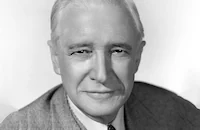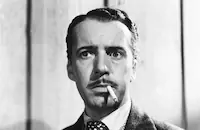Adventure in Washington
Cast & Crew
Alfred E. Green
Herbert Marshall
Virginia Bruce
Gene Reynolds
Samuel S. Hinds
Ralph Morgan
Film Details
Technical Specs

Synopsis
When Senator John Coleridge, the newly appointed head of the Naval Appropriations Committee, is asked for an interview by Washington radio broadcaster Jane Scott, he adamantly refuses and accuses Jane of distorting his positions. Upon retreating to the sanctity of his office, John finds his old friend, Jim O'Brien, waiting to speak to him. When O'Brien asks John to appoint Marty Driscoll, the orphaned son of John's political mentor, as a senate pageboy, the senator is reluctant until O'Brien reminds him of the debt he owes to the boy's father. Upon returning home, O'Brien, who was Marty's father's business partner, learns the boy is in trouble once again and has been arrested for breaking a window. After arranging for Marty's release, O'Brien informs the boy that he has arranged a job for him in Washington, D.C. Rather than being grateful, Marty, a querulous boy with a bad attitude, disdains the opportunity. Upon arriving in Washington, Marty goes to John's office and meets Jane in the waiting room. Jane has been excluded from John's meeting with reporters because she is a woman, and fumes with resentment. When John' s secretary leaves her desk, Jane and Marty become allies, as Jane uses the intercom to eavesdrop on John's interview while Marty guards the door. Over lunch with John and Senator Henry Owen, Marty learns that he must attend school with the other pages and truculently storms out of the restaurant. Dismayed, Owen suggests that John send Marty home, but John remains confident that the boy can be reformed. At page school, Marty meets Bundy, the stern headmaster, who insists upon strict discipline and warns the boys that all governmental information must remain confidential. After Collins, the head page, takes the boys on a tour of the senate chambers, the pages assume their duties. One day, as a prank, the boys send Marty to deliver a message to a non- existent senator. Upon discovering that he has been sent on a wild goose chase, Marty bursts into the senate chambers and slugs Abbott, the boy who handed him the message. As punishment, Marty is ordered by Collins to clean the chambers after hours, but he refuses. Chastised by John, Marty turns to Jane for advice, and she counsels him to stop using his fists to solve his problems and start trying to win the respect of the other boys. A contrite Marty returns to serve his punishment and is soon accepted by his peers. Now reformed, Marty proudly conducts tours of the senate, thus earning John's admiration and affection. One day, Frank Conroy, an influential stockbroker, invites John to a dinner party. Knowing that Conroy is unscrupulous, John at first refuses the invitation until he learns that Jane will be there. At the party, John thanks Jane for reforming Marty and asks her to dance. Later, Conroy calls John into his study and asks for advance information about the appropriations bill. Repulsed, John immediately leaves the party with Jane. On the day of the committee hearing on the bill, Marty overhears Owen and Senator Sam Cummings discuss the contents of the bill and is upbraided by Bundy for eavesdropping. Hounded by reporters, John entrusts his briefcase containing the bill to Marty and instructs him to lock it away. When Owen's position on the bill is leaked to the press, the senator suspects that Marty may be responsible. After Bundy testifies that he witnessed Marty eavedropping on the senators, it is decided to send the boy home. Although both Jane and John retain their faith in Marty's integrity, Marty is bitter, and out of revenge, he divulges the contents of the bill to Conroy. When the pages rally to Marty's support, John urges Owen to give the boy the benefit of the doubt and he agrees. Upon learning that he is to be reinstated as a page, Marty, conscience-stricken, follows Conroy to New York, and with tears in his eyes, pleads with Conroy to keep the information secret. He is too late, however, because Conroy has already passed along the details. When the story appears in the paper, a special investigation is launched into uncovering the leak. John is suspected and interrogated by the committee, his political career in jeopardy. Hearing Jane's broadcast about John's plight, Marty hitchhikes back to Washington, pushes his way into John's office and admits to giving the information to Conroy. Pleading for leniency on Marty's behalf, John suggests that the boy be tried by his peers, the senate pageboys. When the committee consents, the boys unanimously vote for Marty's reinstatement, and Marty then proudly reaffirms his faith in the pageboy credo.

Director
Alfred E. Green
Cast

Herbert Marshall

Virginia Bruce

Gene Reynolds

Samuel S. Hinds

Ralph Morgan
Vaughan Glaser
Charles Smith

Dickie Jones

Pierre Watkin

J. M. Kerrigan
Tommy Bond
Billy Dawson
Charles Lind
Mary Currier
Herbert Rawlinson
Ferris Taylor
Lyle Clement
Morgan Wallace
Gordon De Main
William Dudley
William Gould
George Lessey

Ian Wolfe

James Flavin
O'neill Nolan
Billy Lechner

Bess Flowers
Eddie Laughton
John Holland
Tom London

George Mckay
Edmund Cobb
Dora Clemant

Boyd Irwin
Patti Mccarty
Ed Chandler
Jack Rice
Onest Conley
Gus Glassmire
Hooper Atchley
Paul Mcvey

Walter Sande
Bradley Hall
Fred Anderson
Ralph Gilliam
Frank Wyrick
Stanley Diamond
James Pilcher
Jack Egger
Henry Moss
Crew
Lionel Banks
Albert Benham
Ed Bernds
Arthur Caesar
Lewis R. Foster
W. Franke Harling
Robert Peterson
William A. Pierce
George Rhein
Charles R. Rogers
Henry Sharp
Allen G. Siegler
Jeanne Spencer
Donald Starling
M. W. Stoloff
James Sweeney

Film Details
Technical Specs

Quotes
Trivia
Notes
The working title of this film was Senate Page Boys. According to a February 13, 1941 Hollywood Reporter news item, Les White was borrowed from M-G-M to photograph this film, but was recalled to the studio before the start of production. Lewis R. Foster, who wrote the screenplay with Arthur Caesar, also wrote the story for the 1939 Columbia film Mr. Smith Goes to Washington (see AFI Catalog of Feature Films, 1931-40; F3.2928). According to materials contained in NARS in Washington, D.C., the Office of Censorship disapproved this film for export on the grounds that its depiction of the bribing of a Senate pageboy would "hinder the war effort."












